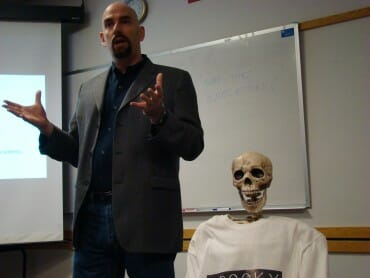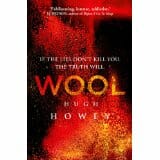What most people don’t know about science fiction conventions is that a lot of them are not about actors or TV shows but about SF writers, and the discussions at the panels are educational, lively and provide a lot of insights into the publishing world. But yesterday I discovered that sf cons are not immune to the controversy over eBooks and indie publishing.
I attended a panel about “The Business of Writing” at SFContario in Toronto. The con was winding down, and I settled in expecting to hear the usual advice for want-to-be authors: get an agent, write short stories, and don’t pay reading fees to agents.
But instead author Robert J. Sawyer inadvertently dropped a bomb on me. When asked what the biggest business mistake a newbie writer could make he replied, “self-publishing or self-ePublishing.” He might as well have said, “Michael McPherson has made the biggest mistake of his career.” While Sawyer recognizes me at cons and remembers that he has mentored me in the past, he probably has no idea that I’ve indie-published. The comment was not just directed at me.
What he said (forgive the paraphrasing) is that only outliers have been successful in self-publishing either in print or electronically, and that you will have “vanishingly few sales” and never succeed as a proper science fiction author if you go the self-publishing route.
Yet, as I listened to this I was surprised to discover that I was encouraged and even more certain that indie-publishing is the road I want to travel. I know that sounds crazy, and I was reminded of a line from the movie Hoffa, so smartly delivered by Jack Nicholson. When several different people told him he should call off a strike, he replied, “If everyone says I’m wrong, I must be right.”
I know that this is the height of arrogance and conceit, but I also know what Mr. Sawyer had said earlier at his Kaffeekaltsch: it will be increasingly difficult and perhaps impossible for a science fiction author to make a living just from writing.
An indication of the direction the industry is going can be found in the subscription numbers of Analog Magazine: at its peak back in the seventies it had 160,000 subscribers, but now it has around 28,000. I’m also willing to bet a lot of those are older boomers, so as that generation goes on their ultimate adventure, Analog will probably also go down forever.
I’m sure Sawyer’s career will be fine because he’s so well known and has won every important science fiction writing award at least once, but a newbie like me–fighting to break into a dying industry–has nothing to lose by taking the road less traveled. The big six are struggling to adapt to eBooks, and their desperate throes are creating market opportunities.
If I landed a contract today with any publisher, my debut novel would have to compete head-to-head with Robert J. Sawyer’s umpteenth novel–one $10 paperback versus another. But I’ve checked the prices of Sawyer’s Kindle editions and discovered that they’re priced between $10-$13, with many of them more expensive than their paperback editions.
Wow! That means Vampire Road at 99 cents is less than one-tenth the price of most of Sawyer’s novels, and when I launch the prequel, The Book of Bertrand, at $2.99 it’ll still be less than a quarter of the price. This cut-rate is the only hope for a newbie author trying to seize a piece of the incredibly shrinking pie.
I considered putting my hand up and debating this with Mr. Sawyer–starting a lively old fight–but most of the authors were enjoying the last panel of the conference, and I knew there was little hope of swaying hearts and minds. The proof will come in the next couple of years, but even if I have “vanishingly few sales,” I suspect it will be more than if I was still desperately waiting to hear back from a publisher. And I’ll make this promise, if I haven’t had any luck by SFContario Four, I’ll volunteer for a panel: why ePublishing may not be for you. I love being on panels. Either way, it’ll be an interesting ride.






